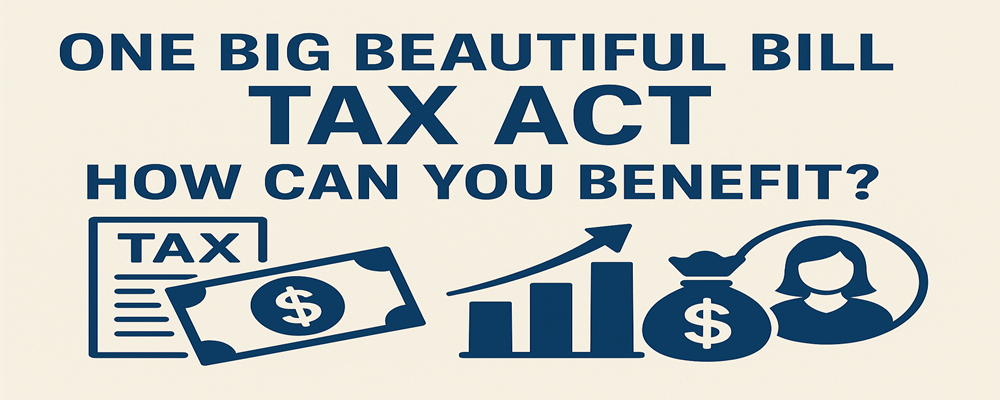Focus: Gambling Losses
On July 4, 2025 President Donald J. Trump signed into law H.R.1 – One Big Beautiful Bill Act (“OBBBA”). OBBBA contains hundreds of provisions including permanently extending the individual tax rates Trump signed into law in 2017, which were originally set to expire at the end of 2025.
The OBBBA has made changes to the tax treatment of gambling losses, effective January 1, 2026.
Prior Law:
Prior to the enactment of the One Big Beautiful Bill Act (OBBBA), taxpayers could deduct gambling losses only to the extent of their gambling winnings. Gambling losses in excess of winnings are not deductible. Taxpayers must report the full amount of their gambling winnings (with no reduction for gambling losses) for the year as income on Form 1040, and then deduct their gambling losses (up to the amount reported as gambling winnings) for the year separately on Schedule A (Form 1040) as an itemized deduction.
Also starting with 2018, the limitation on losses from gambling transactions applies not only to the actual betting costs, but not to other expenses incurred in connection with gambling activity. For instance, a taxpayer’s otherwise deductible expenses in traveling to or from a casino are permitted only to the extent of gambling winnings.
OBBBA Gambling Loss Deduction:
Under the OBBBA you can still deduct gambling losses on your federal taxes, but only up to 90% of your gambling winnings. This new limitation on the deductibility of gambling losses will apply to all taxpayers, regardless of whether they gamble professionally or recreationally.
But Beware……
This deduction change can lead to individuals owing more taxes on what appears to be a break-even or even losing gambling year. To deduct gambling losses, you must itemize deductions on Schedule A of Form 1040. If you claim the Standard Deduction, you cannot deduct gambling losses. You also must report your winnings and losses separately on your tax return.
Record Keeping Requirements
It is extremely important for individuals who gamble to keep meticulous records of all winnings and losses. Taxpayers must keep an accurate diary or similar record of their losses and winnings. The diary should contain at least the following:
(1) The date and type of the specific wager or wagering activity;
(2) The name and address or location of the gambling establishment;
(3) The names of other persons present with the taxpayer at the gambling establishment; and
(4) The amounts the taxpayer won or lost.
A taxpayer can generally prove his or her winnings and losses through Form W-2G, Certain Gambling Winnings; Form 5754, Statement by Person(s) Receiving Gambling Winnings, wagering tickets, canceled checks, substitute checks, credit records, bank withdrawals, and statements of actual winnings or payment slips provided by the gambling establishment.
For specific wagering transactions, a taxpayer can use the following items to support his or her winnings and losses:
(1) Keno: Copies of the keno tickets the taxpayer purchased that were validated by the gambling establishment, copies of the taxpayer’s casino credit records, and copies of the taxpayer’s casino check-cashing records.
(2) Slot machines: A record of the machine number and all winnings by date and time the machine was played.
(3) Table games (twenty-one (blackjack), craps, poker, baccarat, roulette, wheel of fortune, etc.): The number of the table at which the taxpayer was playing. Casino credit card data indicating whether the credit was issued in the pit or at the cashier’s cage.
(4) Bingo: A record of the number of games played, cost of tickets purchased, and amounts collected on winning tickets. Supplemental records include any receipts from the casino, parlor, etc.
(5) Racing (horse, harness, dog, etc.): A record of the races, amounts of wagers, amounts collected on winning tickets, and amounts lost on losing tickets. Supplemental records include unredeemed tickets and payment records from the racetrack.
(6) Lotteries: A record of ticket purchases, dates, winnings, and losses. Supplemental records include unredeemed tickets, payment slips, and winnings statements
What Should You Do?
You know that at the Law Offices Of Jeffrey B. Kahn, P.C. we are always thinking of ways that our clients can save on taxes. If you are selected for an audit, stand up to the IRS by getting representation. Tax problems are usually a serious matter and must be handled appropriately so it’s important to that you’ve hired the best lawyer for your particular situation. It’s important to consult with a tax professional for personalized advice on how these changes might affect your specific tax situation. The tax attorneys at the Law Offices Of Jeffrey B. Kahn, P.C. located in Orange County (Irvine), Los Angeles, San Francisco Bay Area (including San Jose and Walnut Creek) and elsewhere in California are highly skilled in handling tax matters and can effectively represent at all levels with the IRS and State Tax Agencies including criminal tax investigations and attempted prosecutions, undisclosed foreign bank accounts and other foreign assets, and unreported foreign income. Also if you are involved in cannabis, check out what a cannabis tax attorney can do for you. And if you are involved in crypto currency, check out what a bitcoin tax attorney can do for you.


